Posted by Managementguru in Decision Making, Human Resource, Principles of Management, Project Management, Training & Development
on Mar 19th, 2014 | 0 comments
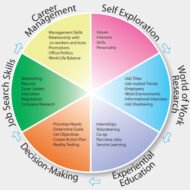
Have you ever thought about how to gain insight into yourself? Well, it is high time, if you really want to make it to the top of your career path and it is supposed to be the best personal strategy. Setting up of long range plans helps you to formulate your career strategies accordingly. To reach the destination, you need to have clear travel plans. Like wise, devising your career plans is inevitable to reach the ultimatum in your work environment. Following is a five step chart to help you create a solid career plan. Self Evaluation What do you enjoy? What are your priorities? Strengths and weaknesses? Name the things you want from a job? Skills Analysis What are your qualifications and experience? What are your key strengths and skills? What are your biggest achievements to date? What are your areas of development/ which area of interest excites you the most? Set your direction The broad industries that really appeal to you. The types of roles that would suit you best. How these options match your personal preferences? Key skills you’ll need to develop. Commit to a time frame Make milestones for the next six, twelve, eighteen months. How will you achieve your training and education goals? How will you gain additional skills and experience needed? How will you expand your network, and by when? Review your career plan Now you know your goals and how to achieve them, monitor your progress at least every six months to stay on track. I reckon that the following tenets infuse some confidence to those who want to achieve: Set your goals highNever settle for lessNever under estimate yourselfYou are born to achieve somethingYou are different from othersYou possess that “in thing” that is going to take you places Career advancement, is something that is not the sole proprietorship of the managerial cadre. It applies to anyone who has the “will” to learn and move forward. One’s attitude towards time, achievement, change, material things, work etc., determines the extent to which he is prepared to pursue his career with a long range plan. managementguru.net Decision Making: Another important aspect of career planning is the tough preposition of decision making. If a qualified and experienced manager is adept in all areas of management, naturally he gets confused as to “which way to go”, when presented with a chance to take up another job, in pursuit of better career prospects such as pay or promotions. People sometimes tend to resist career planning for the fear of making decisions and sometimes due to the fear of failure of achieving goals in the new set up, which might be a big blow to their ego. This dilemma of choosing a goal is commonly noticed in students who want to pursue higher education. Since it involves not only decision making but also determines their capability to be successful in the chosen field of activity. If an individual wants to become a doctor, he or she has to give up to pursue other opportunities, say, to become a lawyer or an engineer. Commitment: Furthermore, career advancement means more involvement and commitment, which makes you a quick learner. And in the process to achieve your goals, you become well versed in the area of specialization, however complex the subject or situation may be. Psychology has its role to play in career planning too. People who are extroverts easily manage to work things up to their advantage, for the simple fact that they socialize well, which is important for a manager to be a good liaison. Time Frame: The planning horizon of your career depends on the time taken to make yourself qualified to suit...

Posted by Managementguru in Business Management, Entrepreneurship, Human Resource, Leadership, Principles of Management, Training & Development
on Mar 18th, 2014 | 0 comments
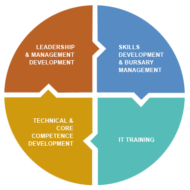
Executive Development – Options are Wide Open Who is an Executive: A person or group having administrative or managerial authority in an organization. While “executive” and “manager” and “leader” are often used interchangeably, “executive” is commonly used to signify the top 5% to 10% of the organization. Executive Development : aimed at developing the skills and competencies of those that (will) have executive positions in organisation. Capabilities of a Good Manager: A good manager can make an organization grow, survive and shine amidst tough competition, if he is bestowed with corporate competencies such as perseverance, capacity to put in hard work, sense of loyalty and responsibility, all of which may be inherited or acquired qualities. Loyalty stems from internalized morality that may be a result of his value system. Executive success is what the organizations should aim for, and firms should try to figure out the fundamental components that make up the success formula or equation. Road to Self-Development: In less developed countries, employees are more than satisfied if they are provided with a job that offers safety and security. Their thinking is restricted to mere physical and biological comforts and does not go beyond that point, where self development and self-actualization come into the picture. In developed countries, the situation is quite different, where the workers aim for empowerment and look for reasons that motivate them to do a job. Money also has its due role to play, and people whose wages are very meager cannot be expected to aim for empowerment, where their single motive is mere survival. Abraham Maslow’s Point of View: Abraham Maslow puts forward the hierarchical needs theory, arguing that, there are five levels of needs for people in general, right from physiological needs at the bottom of the pyramid and need for self actualization at the top, and safety, security and esteem needs coming in between. He points out that, once a need is satisfied, it ceases to be a motivator. This is so evident in our day to day lives, where wants and needs never cease to exist and once a want is satisfied, human mind wanders to catch hold of another. So, organizations should understand and analyze, what factors best motivate their employees, particularly their managers (who might serve as a source of inspiration to their subordinates).It should be remembered that non-availability of jobs leads to dissatisfaction whereas availability of jobs need not motivate employees. Some factors which have been proven to be real motivators are as following: Recognition Opportunities for self development Additional responsibilities(lateral expansion) Timely rewards(in terms of money and appreciation) Security Inculcating a sense of belongingness Conducive corporate atmosphere Corporate culture Good human relations Economic burden makes people less enthusiastic and anxious in developing countries and this hinders them from delivering to their fullest potential. Also the bureaucratic approach followed by conservative firms, autocratic leadership style and lack of supportive atmosphere make people work like automatons devoid of creativity. Such firms may show good results in terms of productivity initially, but in due course has to pay the price, in terms of absenteeism, high attrition rates and less efficiency. It has been proven that job satisfaction is directly proportional to efficiency. When people find a job tedious and monotonous, they tend to lose interest, which will be evident from their lack lustrous performance. Performance management has its bearing on executive success and by providing with ample scope for career advancement and autonomy; managers prove their mettle even within limited scope of resources. Acceleration of executive change implies the development of the executive mind for performing managerial activities in a better way. Note : A survey of CEOs in Fortune 500 enterprises indicated that executives spend little time with their...

Posted by Managementguru in Business Management, Organisational behaviour, Principles of Management
on Mar 6th, 2014 | 0 comments
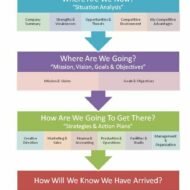
The Management Planning Process We have heard of “Master Plans” being structured and engineered to give astounding results that is purely systematic in approach and masterly in execution. Planning facilitates to make use of the opportunities that are available in the environment to make it to the top. Opportunity Analysis is nothing but, an awareness of the factors in the external environment; understanding of the strength and weaknesses of the organization. This is the first step of planning where we have to scrutinize the market, competition, customers’ preferences, tastes, our strengths and weaknesses. Establishing Objectives is another criterion that ensures “Where we want to be, and what we want to accomplish and when”. What are Objectives? Objectives are set for the organization and each subordinate is also entrusted with them. Objectives lay emphasis on goal setting which normally emanates from the top, but it may also originate from the bottom. Management by objectives is a great concept that involves all the employees working for the organization to be a part of goal setting and decision making. Planning Premises: Premises are “Assumptions” about the ‘environment.’ It involves identification of critical factors of the environment that affect the planning. Examples of critical factors are government policies, tax rates, business cycle development, economic indicators, economic forecasts etc. No body can precisely predict the environment factors precisely and make an accurate forecast. However one can fairly predict the critical factors required for the plan. Identifying Alternatives is very significant in a corporate business environment as every plan has got a set of alternative course of action. A reasonable number of alternatives can be developed for a plan. Evaluating Alternatives and Selecting the Best: A reasonable number of alternatives can be evaluated on the basis of the principle of limiting factor. The limiting factors may be costs, time, manpower and other resources. By applying techniques of operations research, every alternative can be evaluated. For e. g. alternative ‘A’ may benefit the organization in the short term but may be more expensive and alternative ‘B’ may benefit in the long run but may be less expensive. If one wants to earn immediate profits by spending more money he can choose alternative ‘A’. If the limiting factor is cost, he is forced to choose alternate plan ‘B’. Planning is not complete with selecting the best alternative; a set of derivative plans are developed to support the basic plan. For example an educational institution might like to own a fleet of buses, for which derivative plans for selection has to be made- training of drivers and maintenance staff are supportive plans for the main plan-procurement of buses. Developing budgets completes the planning course of action and budget is referred in financial terms and they are required to control the plans. Planning is the Prime Function: Planning is the prime function of all as it precedes all functions. 1. The objectives must be clear, verifiable and attainable. 2. Planning premises are vital to the success of planning as they supply information related to future like probable competitive behavior, general economic conditions, capital and material availability, government control etc. 3. All the critical factors are clearly and thoroughly analyzed and taken into consideration. One should be able to identify clearly the critical factors that limit the attainment of the goal. It could be costs, time, manpower or any other resources. 4. In a practical business situation, one should be clearer in identifying these factors, only then the selection of the best alternative is possible. 5. Any decision taken in a plan is valid for a particular period i.e., the plan may be short term or long-term, the commitment principle...

Posted by Managementguru in Business Management, Organisational behaviour, Principles of Management
on Mar 6th, 2014 | 0 comments
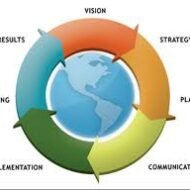
Critical Factors Influencing Corporate Management A corporate management is said to be capable only if it is able to integrate, coordinate and direct the functional capabilities towards overall objectives and common goals of a firm, that have a bearing on an organization’s capacity and ability to implement its strategies. Multitudinous factors affect the functioning of corporate general management system. It differs with each organization with differing objectives and mode of operations. Key Factors or Contributors: The firms must evolve an effective system for corporate planning. The objectives must be realistic and achievable and clear and complete communication of plans to various levels of organization helps in execution of action plans by the respective departments. A pucca management information system is necessary that integrates all the levels through a network of computers, facilitating information processing and task implementation. If the firm is oriented towards a god deal of risk-propensity, chances of rewards are also quite high. You cannot beat your competitors unless you possess a better shade of entrepreneurship in you than others. Competency development backed up by strategy formulations, in the wake of challenges and opportunities in the external environment is well appreciated. Why everybody always talk about strategy? It is one thing that warrants for a sure success, it implies that you are smart enough to think ahead of time, what others have failed to. Don’t you want to set a path forward for the future generations to come? Values that are unique to your organization add to the image of your company. Say, if you project “quality”, as your prime value system, definitely it is going to attract consumers who are very particular about quality unmindful of the price. Slowly the idea gathers momentum and your company’s image gets a boost. But don’t forget that you have to fulfill your commitments in terms of quality without any compromise. Reward systems must be worked out to gear up the morale of top managers who are the achievers of your management objectives. Their track records and degree of commitment should be analyzed to decide on pay and promotions. A favorable organizational climate is inevitable for the organization to progress in the desired direction without any internal politics and power struggles. The role of top management is very crucial in that, it has to identify people with vested interests and bring them back into the groove by making necessary changes in the organization structure or go for weeding out actions if things go out of control. Ultimately, the overall objectives of the organization is what that matters, and people must be trained to accept the organizational changes which form a part of the developmental procedures of management. Social responsibility is much talked about these days, and the corporate firms are in a position to discharge their duties pertaining to social welfare, as part of their corporate management programme.It has become a regular feature of the management process to part with a share of their profit towards a social cause. Corporate management is a comprehensive process that covers all aspects of the management with growth as its motto and social conscience as its...

Posted by Managementguru in Business Management, Marketing, Principles of Management
on Mar 4th, 2014 | 0 comments
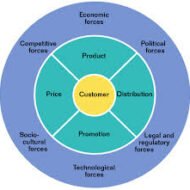
Key Components of Marketing System The core marketing system of a company comprises the suppliers, company, marketing intermediaries and target customers. The success of the company is also affected by competitor’s presence and other segments of public. The management has to watch and plan for all these factors to serve and satisfy the specified set of needs of a chosen target market. Supplier Selection: A company has to choose suppliers who offer the best mix of quality, delivery schedule, guarantee and low cost. Say, a firm involved in manufacturing confectioneries has to procure sugar, cocoa, caramel, milk powder; Labor, equipment, fuel, electricity and other factors of production are also to be obtained. If the company’s product has a good market, it can opt for continuous production. If it is a growing firm, it cannot go for voluminous production, but only supply goods against confirmed orders. In either case, the choice of suppliers is determined by one major factor called ‘cost’. Of course, one can never compromise on quality and so the company has to decide whether to purchase the inputs or make its own. Pic Courtesy : 5 Steps to Successful Supplier Selection The relationship of a company with the suppliers should be of a long-term nature, since any sudden change in the supplier’s environment will have a substantial impact on the company’s marketing operations. Sudden supply shortages, labor strikes and other events can interfere with the fulfillment of delivery promises to customers. This will result in sales decline in the short run and loss of goodwill in the long run. Back orders lead to loss of customers and in course of time their trust. The business firms must plan for alternate source of supply to avoid the risk of over-dependence on any one source of supplier. Company The marketing department has to work in tandem with the other departments of the company namely, finance, production, personnel and research and development, while designing and implementing its marketing plans. Finance department – has to be consulted regarding the availability and deployment of funds to carry out the marketing plans. Production department – to gauge market demand and to decide on the supply of products based on demand. R and D – new product development. Equally important is Digital Marketing which is considered to be an integral part of your promotional activities – What you are seeing above is a depiction of tools that help you in marketing your products online. Marketing intermediaries: Channel members are the link between the company and the customers. Agents and middlemen find customers who are wholesalers or retailers to take on the title and sell the merchandise. Also there are physical distribution firms who assist in stocking and moving goods from the warehouse to the destinations. The marketing executives have to deal with these intermediaries prudently in order to enhance the operational efficiency of the marketing function. Logistic firms, shippers and airliners help to move the goods from one location to another. Competitors: All the business firms in a particular market segment vie for the same resources and customers. A car manufacturing company in an automobile industry has to compete with other car manufacturers as well as with two wheelers. This implies that competition may come in different forms and each company has to identify potential threat from competitors, study their activities and capture their moves to win over the competition. Public: A company has to keep a close watch on people’s preferences to satisfy their requirements and also it is expected to give back something to the society in the form of social welfare measures. Employees belonging to different culture groups with differing attitudes,...










